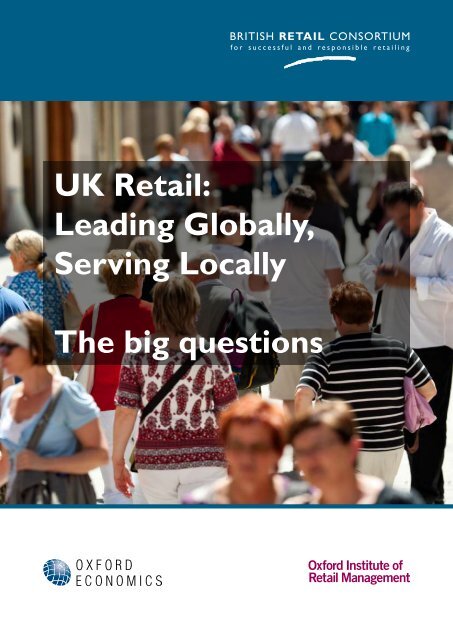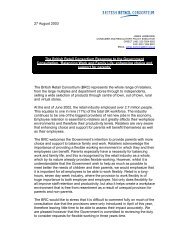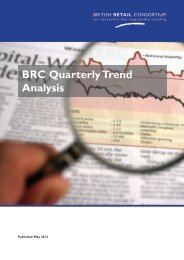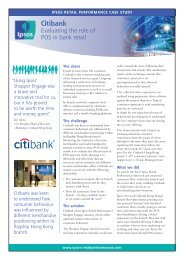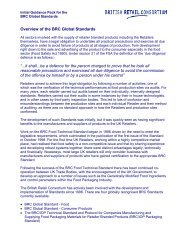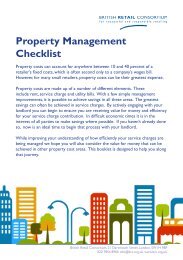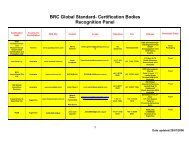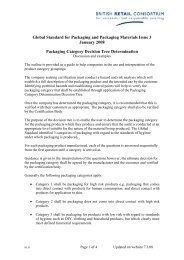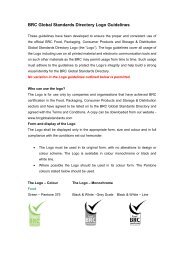UK Retail: Leading Globally, Serving Locally The big questions
UK Retail: Leading Globally, Serving Locally The big questions
UK Retail: Leading Globally, Serving Locally The big questions
Create successful ePaper yourself
Turn your PDF publications into a flip-book with our unique Google optimized e-Paper software.
<strong>UK</strong> <strong>Retail</strong>:<br />
<strong>Leading</strong> <strong>Globally</strong>,<br />
<strong>Serving</strong> <strong>Locally</strong><br />
<strong>The</strong> <strong>big</strong> <strong>questions</strong>
<strong>UK</strong> <strong>Retail</strong>: <strong>Leading</strong> <strong>Globally</strong>, <strong>Serving</strong> <strong>Locally</strong><br />
<strong>The</strong> <strong>big</strong> <strong>questions</strong><br />
•<br />
•<br />
•<br />
•<br />
•<br />
•<br />
•<br />
•<br />
•<br />
•<br />
•<br />
1<br />
2<br />
3<br />
•<br />
•<br />
•<br />
4<br />
•<br />
•<br />
•<br />
What role does retail play in the <strong>UK</strong>’s economic<br />
success?<br />
<strong>Retail</strong> sales totalled £292 billion in 2010, equivalent to around 20% of <strong>UK</strong> GDP.<br />
<strong>The</strong> retail sector consistently accounts for around 5% of Gross Value Added in the <strong>UK</strong> economy.<br />
14% of all <strong>UK</strong> investment made by large non financial-sector firms is made by large retailers.<br />
<strong>Retail</strong>ers purchase around £180bn worth of goods for resale, supporting £47bn of output from other<br />
sectors.<br />
<strong>Retail</strong>ers pay out £4 billion every year in dividends to shareholders, around 5% of the <strong>UK</strong> total.<br />
Do <strong>UK</strong> customers get a good deal, compared to<br />
other countries?<br />
<strong>UK</strong> consumers currently pay around 5% less for their basket of goods than citizens of the Eurozone.<br />
<strong>UK</strong> retailers are less expensive in every sub-category of goods except for alcohol and tobacco, which<br />
are more expensive due to much higher duty rates.<br />
<strong>The</strong> price of food in the <strong>UK</strong> remains lower than the European average, despite strong cost-push<br />
inflation driven by the sharp depreciation of sterling.<br />
<strong>UK</strong> clothing retailers have been more effective in shielding consumers from rising cotton prices than<br />
their European counterparts.<br />
Are <strong>UK</strong> retailers as productive as overseas<br />
retailers?<br />
<strong>UK</strong> retailers are increasingly more productive than their European counterparts.<br />
Labour productivity in the <strong>UK</strong> retail sector rose by over 40% from 1995 to 2007, compared to less than<br />
10% in France and Germany.<br />
Overall productivity in the US has risen more quickly due to a lighter touch regulatory environment,<br />
particularly on planning.<br />
Expanding <strong>UK</strong> retailers generate an increasing proportion of sales and profits from overseas customers,<br />
both abroad and as tourists to the <strong>UK</strong>.<br />
As well as earning export revenue, retailing strengthens the <strong>UK</strong>’s brand overseas.<br />
What value do retail jobs have for the <strong>UK</strong> economy?<br />
Around three million people work in retail, the largest private sector employer in the <strong>UK</strong>, accounting<br />
for 10.5% of total employment.<br />
<strong>Retail</strong> employment is far more flexible than most other sectors - the sector has a much higher<br />
proportion of part-time workers, and of these 84% combine their jobs with other commitments, such<br />
as studying or caring, or are enabled to remain in the labour force despite illness or disability.<br />
<strong>Retail</strong>ers account for over 12% of the total training spend in the <strong>UK</strong>. On average, retailers invest £1,275<br />
in training per employee per year, compared to just over £800 in the financial sector and £1,200 in<br />
manufacturing.<br />
<br />
<strong>UK</strong> <strong>Retail</strong>: <strong>Leading</strong> <strong>Globally</strong>, <strong>Serving</strong> <strong>Locally</strong>
<strong>UK</strong> <strong>Retail</strong>: <strong>Leading</strong> <strong>Globally</strong>, <strong>Serving</strong> <strong>Locally</strong><br />
5<br />
Does retail make a fair contribution to the public<br />
purse?<br />
• <strong>The</strong> retail sector pays £17.5 billion per year, 9% of the <strong>UK</strong> total, of the four largest taxes (VAT, Business<br />
Rates, National Insurance and Income Tax). This is made up of:<br />
• Around £8 billion (4 to 5%) of National Insurance and Income Tax, reflecting its role in employing<br />
part-time workers and those new to the world of work.<br />
• Around £5 billion per year (9% of the total) of VAT payments.<br />
• Around £5 billion per year (28% of the total) of Business Rates.<br />
• Around £5 billion per year (over 11% of the total) in Corporation Tax is paid by the distribution sector<br />
(wholesale and retail),which makes less use of exemptions than other sectors.<br />
• <strong>Retail</strong>ers also make substantial contributions to the public purse through fuel duty, landfill tax, the<br />
Climate Change Levy and, in future, the Carbon Reduction Commitment.<br />
6<br />
•<br />
•<br />
•<br />
•<br />
7<br />
•<br />
•<br />
•<br />
•<br />
•<br />
What’s the changing shape of retail?<br />
As shopping habits change, town and city centre retailing needs to adapt to meet ever strengthening<br />
competition from other channels and locations. <strong>The</strong>se challenges are separate from, but magnified by,<br />
the current economic downturn.<br />
Successful retail locations combine small and large retailers, with the most successful smaller firms a<br />
critical source of innovation and future growth.<br />
Historically retail births and deaths have been roughly equal, at around 23,000 in 2007. Births<br />
subsequently declined to 21,000 in 2009, with possible implications for future innovation.<br />
Constant innovation and adaptation to customer demand means that there will always be winners and<br />
losers.<br />
What is the impact of multichannel retailing?<br />
Total non-store retail sales were £30.3 billion in the <strong>UK</strong> in 2010, of which internet sales comprised<br />
£23.4 billion.<br />
With an estimated 11% of global internet retail sales, the <strong>UK</strong> was the number three market, equivalent<br />
to Germany and France combined.<br />
Consumer power has been enhanced by internet retailing, which enables ready access to greater<br />
information, price comparisons and other consumers’ recommendations.<br />
New mobile platforms, including smartphones and tablets, are being adopted by consumers and are<br />
leading retail into new territory.<br />
A substantial minority, 41%, of <strong>UK</strong> households reported ‘never’ using the internet for shopping in 2010<br />
and traditional channels remain important to these consumers.<br />
<strong>UK</strong> <strong>Retail</strong>: <strong>Leading</strong> <strong>Globally</strong>, <strong>Serving</strong> <strong>Locally</strong>
www.brc.org.uk<br />
For further information please contact:<br />
British <strong>Retail</strong> Consortium<br />
21 Dartmouth Street<br />
Westminster<br />
London, SW1H 9BP<br />
020 7854 8900<br />
info@brc.org.uk<br />
<strong>The</strong> full copy of this report is available to BRC<br />
members, and to the media, via the Press Office on<br />
020 7854 8924, 020 7854 8920, 07921 605 544.<br />
www.brc.org.uk


